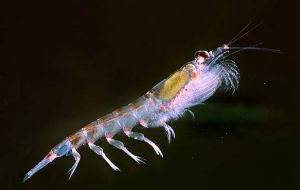MercoPress. South Atlantic News Agency
Two leading groups involved in major dispute over krill properties’ patents
 Krill extract allegedly helps reduce cholesterol, platelet adhesion and plaque formation in humans
Krill extract allegedly helps reduce cholesterol, platelet adhesion and plaque formation in humans US Patent and Trademark Office (USPTO) this week granted Aker BioMarine’s request for re-examination of US patent number 8,030,348 assigned to competitor Neptune Technologies and Bioressources. The re-examination was approved for all 21 claims of the patent and in consideration of multiple references presented by Aker BioMarine.
This is the patent that Neptune asserted against Aker BioMarine and other companies in recent lawsuits in the state of Delaware. “[Aker BioMarine‘s] request for inter partes re-examination establishes a reasonable likelihood that [Aker BioMarine] will prevail with respect to claims 1-21 of the US Patent Number 8,030,348,” USPTO said in its decision.
In affirming the rejections, the Examiner notes that the originally granted patent claims minimally read on fresh krill meat -- a natural product “obviously” not invented by Neptune, Aker wrote in a statement.
”We are very confident with regard to our freedom to operate from Neptune‘s patents worldwide, and this decision from the USPTO confirms what we already knew, namely that the ‘348 patent was only granted because the USPTO was not provided with relevant prior art during its prosecution,” stated Aker BioMarine‘s Executive Vice President for marketing and sales Matts Johansen.
“Neptune should now withdraw its frivolous lawsuits, stop sending intimidating letters to distributors and marketing companies, and rather focus on competing fairly in the marketplace.”
Likewise, last month Neptune announced the USPTO granted it US patent number 8,057,825 (the ‘825 patent) directed to methods of reducing cholesterol, platelet adhesion and plaque formation in humans through the administration of krill extract. The same day, Aker BioMarine filed in the USPTO a request for re-examination of that patent.
This comprised the second re-examination request that Aker filed in this regard in the previous five weeks.
“Unfortunately, Aker’s press release announcing its re-examination request, as well as other related statements made by Aker to the press, appear designed to mislead the public about the validity of Neptune’s patent rights and the re-examination process,” Neptune accused. “Any suggestions by Aker that Neptune misrepresented to the USPTO the novelty of the inventions claimed in the ‘825 patent are baseless.”
“The USPTO deemed Neptune’s claims to be novel and non-obvious, and therefore granted the ‘825 patent to Neptune,” Neptune asserted.
Regarding the likely outcome of the new re-examination, the industry should take guidance from the USPTO‘s publicly available statistics showing that, in 89% of cases where re-examination is granted, the claims are either changed (45%) or cancelled completely (44%), Aker BioMarine said. (FIS)




Top Comments
Disclaimer & comment rules-

Read all comments” . .reducing cholesterol, platelet adhesion and plaque formation in humans through the administration of krill extract (krill 'meat')“
Jan 02nd, 2012 - 10:31 am 0It seems to me that the only ”novel and non-obvious” feature here is the *claim* that processed krill can help these things, not the substance itself.
Can one patent a 'claim'?
Commenting for this story is now closed.
If you have a Facebook account, become a fan and comment on our Facebook Page!